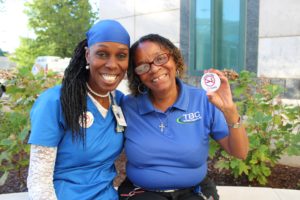
Vivian Cash (right) shows off a smoke-free pin, next to her proud smoking cessation facilitator, Odetta Muhammad, RN.
“On September 1, 2017, I had my last cigarette. My daughter Erica was so proud of me, she organized a one-year, smoke-free party to celebrate my anniversary. It was something special,” said Vivian Cash, who at 58 years old has completely kicked the habit after being a smoker since 9th grade.
Her will to quit, coupled with enrolling in Grady’s Smoking and Tobacco Cessation Program, made it possible.
“This is a powerful program. When I learned about the toxins and chemicals in cigarettes, and how secondhand smoke was impacting my daughter who lives with me, it opened my eyes to the damage I was doing to my body. I was hurting myself and my family. I had to make a change,” Cash said.
Success stories like Cash’s, and the need to reach even more patients, have led to a recent extension of the program from the Ear, Nose Throat (ENT) Clinic to Primary Care, Neighborhood Health Centers, and the Emergency Department.
“One of the most significant contributors to serious health problems like heart disease, stroke and cancer is smoking. That’s why we needed to take this program directly to patients beyond ENT, and give them resources that could make quitting possible,” said Dr. Charles Moore, chief of Otolaryngology at Grady.
The extended program went live on October 9, with 10 newly-trained smoking cessation facilitators leading weekly classes across the health system. Moore is hopeful more facilitators can be trained as the program continues to grow.
“Smoking is a difficult habit to break, but quitting is one of the best decisions you could make for your health and quality of life. My goal is to have the program extend to every level of the health care system at Grady, with evening and Saturday classes,” Moore said.
Cash occasionally attends classes at Grady as a successful graduate of the program, and talks to newcomers about her experience to help them ease into the lifestyle change. She’s also enjoying her smoke-free life, saying quite simply: ‘There’s no turning back.’
“I don’t smell like smoke all the time, I save money, and people say I’m looking better. I’m in good health, and I want it to stay that way.”
More about the program:
Originally launched in 2008, the four-week long, group classes use the evidence practice model for smoking cessation from the American Cancer Society. Classes offer counseling, social support, nicotine replacement therapy through telephone quit line networks and follow-up with as primary care physician. The program also allows for interaction among participants, who are able to connect and learn from each other’s struggles experiences, and wins.
“Since 2008, the program has seen over 300 participants, with a significant number of quitters for life at approximately 48%,” said Odetta Muhammad, the program’s lead facilitator.
